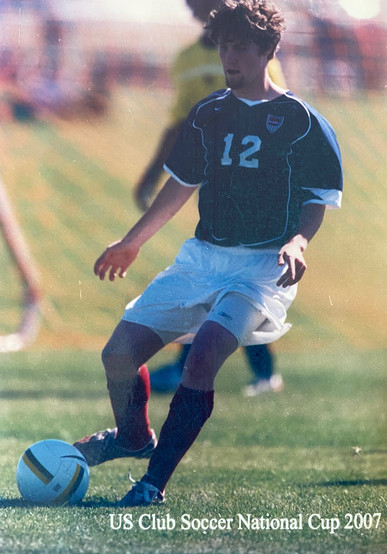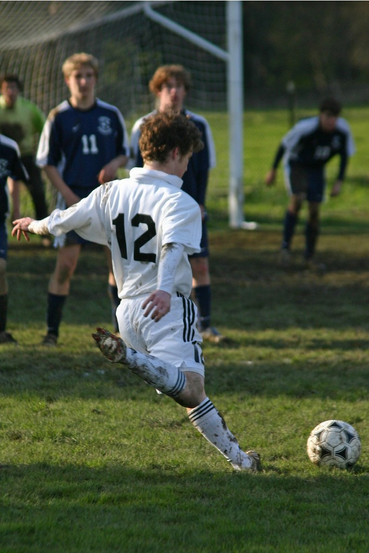Keegan's Story
- Coach Keegan

- Apr 3, 2022
- 6 min read
Updated: Nov 29, 2022
Throughout my life, soccer has always been a constant. Even when I took some time away from playing, the ball was always rolling across my TV and I was following my favorite teams and players. I am truly passionate about the sport and I want to help young players reach their full potential. I do not want kids to have the same experiences that I had when playing youth soccer. Club soccer can play a major impact on one’s life and can affect someone for years or even for life. I am sharing my personal story with youth club soccer because I feel it defines my outlook, expectations, and philosophy on coaching. In addition, my experiences and insight may be valuable to others.
I grew up in Whatcom County, WA and was limited in club selection. The only club in the county at the time was WFC Rangers in Bellingham. I started out in the Whatcom Development League (WDL) for U11 and U12 (this was the feeder system for WFC Rangers back then). This was my first taste of competitive soccer and I loved it. To this day, I still believe the coach I had for these two years is the best coach I ever had. He had high expectations, taught us what he knew, but also taught us that motivation comes from within and not from a coach or parent. Several of his players went on to play high level soccer.
I tried out for WFC Rangers' U13 team and made their B team. I quickly noticed that I could move up to a better team, but WFC Rangers did not do any cross team training at the time. This experience led me to believe that playing for a team and club that fits a player’s potential is important for player development. If a player develops faster or slower over time, adjustments should be made. But in my case, there was no pathway and no opportunity.
The next year I tried out again hoping to make the A team. Unfortunately, I was once again selected for the B team. The A team consisted of the same players from the previous year and no call ups or call downs (except for the previous year's B team parent coach's son). This was very frustrating to me as a 13 year old. I felt like I was stuck. I felt held back. I once again had a superb year. In one game, I netted 4 goals and had several multi-goal games. But not only was I scoring a lot, my mental game was far superior to my teammates and the opponents in my league (field vision, attacking runs, finding space, etc). My coach started to see that I needed to play at a higher level however, he did not have a relationship with the A team coach to arrange a training or a guest playing opportunity (was not his fault, it was the clubs organization).
For my U15 year, I tried out for the age group above me (U16) and made their B team. I was extremely excited about this because it felt like I had finally moved up. However, because I finally had better competitors, my skills improved and I found myself in the same position as before. I was one of the better players on the field and once again the B team and A team coaches did not have a working relationship.
Half-way through my U15 year (I was playing at U16), I tried out for Northwest Nationals and made it. Making this team felt amazing. I was given a chance to be a starter on this team, which played two leagues above the WFC Rangers team that I could not get onto. This team was located in Edmonds, which was almost 90 miles away from my house. I would drive around 90 minutes each way to practice and more often than not, 100 miles or more away for games (home and away). This taught me dedication and is something that a lot of players will not have the opportunity to learn because of the cramped market of youth soccer clubs today (except for maybe .5% of kids playing extremely high level soccer). It also taught me time management. I was able to play club soccer, play high school sports, take advanced classes, be the drum major of my high school's marching band, was elected ASB vice president, coached a U10/11 soccer team for 2 years and participated in other extra curricular activities all while maintaining a 3.5 GPA.
I had a great experience with Northwest Nationals. Coaches communicated, worked together, and set high standards. Here I learned and felt the impact that positive reinforcement has on players. An interesting experience that I had while at this club was getting to experience a former professional player (Ajax) as a coach. I felt as though at times he had trouble conveying what he had going on in his head. He was a great guy but, my other coach was was a former Seattle Pacific University player was a better overall coach from my experience (he also had an education background). I played with Northwest Nationals for the rest of my U15 year as well as U16 and U17.
For my U18 year, my Northwest Nationals team folded due to players wanting to play for better teams their final year before college. I found myself back with WFC Rangers and with my age group. They had a new coach from a Community College I felt like taking a chance on (and I would get 3 hours back in my day). I believe this year put the nail in the coffin for me playing in college. I now played on a team with the kids that never really accepted me ( I didn't think about this when accepting the spot). Any time I had seen these kids previously on the field they always acted cocky and presented themselves as if they were above me. Not a lot changed when I wore the same jersey as them. The new coach did not seem very invested which lead to lackluster sessions. The coaching and the team made it hard for me to feel as if I fit in and the sessions weren't preparing me for college soccer. The last roadblock I ran into in youth soccer was about half of the players on this team did not show up to practice consistently for this last year. We only had 6-10 players at practice at a time and because of this, most of our training was poor. Club and team expectations were not established and players on the team lost out on development (I was one). This experience leads to my belief that it is important to create a healthy environment that players WANT to be in. If players do not have a desire to come to practice, then it hurts the other players as well.
Throughout that year, I talked with college coaches across the country, but did not make a decision. I felt defeated and unmotivated to play in college. The exact opposite of what a youth club soccer should strive for. I made the decision to not play in college and focus on music for a few years. After a break from the sport, I came back and played in mens leagues and for BV Wevelinghoven in Germany. I felt a reignited flame to become more involved with the game again.
In 2020 I got a coaching job with Titans FC. Since my teams have won a Washington Cup, several tournaments, league titles, and I took a team who did not win a game one season, to only losing one the next season. But it's not always about the results. I have created atmospheres on teams that started the season with the minimum roster, and by the end of the season the roster is filled with the players friends. I have showed players how to lead their peers on and off the field. I have helped kids develop into young adults by teaching them life skills through soccer. This is what it's all about. At the end of the day what did you get out of your youth soccer experience? Did you pay a ton of money for a brand and sub par coach with insane parents? Or did your kid make lifelong memories with lifelong friends?
Why did I create Nebula? Because it's what I would have wanted and needed when I was your kid's age.
















Comments